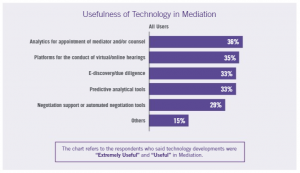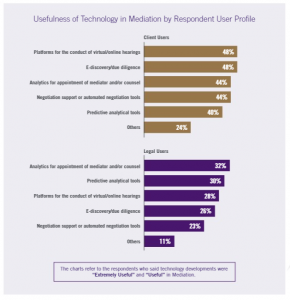This is the final part of a series of posts on The Singapore International Dispute Resolution Academy’s (‘SIDRA’) recently released International Dispute Resolution Survey: 2020 Final Report (‘2020 SIDRA Survey’).
The SIDRA Survey delves into the user experiences of Legal Users (lawyers and legal advisers) and Client Users (corporate executives and in-house counsel) in international commercial dispute resolution: arbitration, litigation, mediation and hybrid mechanisms. The executive summary of the SIDRA Survey can be accessed here.
The 2020 Survey results shows a significant use and appreciation of technology in mediation among Client Users especially. This trend is broadly in alignment with the digital transformation that is happening all around the world, as technology takes root in how we do business, work and communicate with others in a post-pandemic world.
Mediation and Technology

Source: 2020 SIDRA Survey, Exhibit 7.4.1
In terms of how useful technology is in mediation, approximately one third of respondents indicated that analytics for the appointment of mediator and/or counsel (36%), platforms for the conduct of virtual/online hearings (35%), e-discovery/due diligence (33%), predictive analytical tools (33%) and negotiation support or automated negotiation tools (29%) were ‘extremely useful’ or ‘useful’. In the months following the Survey, social distancing has become a standard way of living and doing business with the global pandemic.So platforms for the conduct of virtual/online sessions have the potential to become the ‘new normal’ for conducting mediation sessions.

Source: 2020 SIDRA Survey, Exhibit 7.4.2
Client Users were more likely to recognise specific technology as ‘extremely useful’ or ‘useful’ as compared to Legal Users. For example, 44% of Client Users (compared to 32% of Legal Users) rated analytics for appointment of mediator and/or counsel as ‘extremely useful’ or ‘useful’. Further, 40% of Client Users (compared to 30% of Legal Users) rated predictive analytical tools as ‘extremely useful’ or ‘useful’. These findings suggest that Client Users are ahead of Legal Users in recognizing the usefulness of technology in mediation process, showcasing progressive and practical thinking on the part of Client Users.
48% of Client Users (compared to 28% of Legal Users) rated platforms for the conduct of virtual/online hearings as ‘extremely useful’ or ‘useful’. In addition, 48% of Client Users (compared to 26% of Legal Users) rated e-discovery/due diligence as ‘extremely useful’ or ‘useful’.
The difference in responses between Client and Legal Users is significant. Could it be that Client Users have greater incentive to minimize the length and cost of mediation, and therefore rate ODR platforms and e-discovery/due diligence tools more highly than lawyers? By availing themselves of virtual platforms, Client Users are able to participate in meetings and mediation sessions online with minimal disruption to their schedules and business. They can also avail themselves of the convenience of uploading documents and evidence online.
In further findings, 44% of Client Users (compared to 23% of Legal Users) rated negotiation support or automated negotiation tools as ‘extremely useful’ or ‘useful’.
While only one third of users overall ranked the utility of specific technologies highly, Client Users are ahead of Legal Users in terms of recognising the utility of technology in cross-border mediation. Naturally, these findings can be interpreted in different ways. SIDRA will be conducting follow up interviews with respondents to dig deeper into the difference in responses between Client and Legal Users, and to explore how Covid-19 has affected the technology experience in international mediation and dispute resolution. In any event, these findings, as they now stand, identify an timely opportunity for Legal Users to consider greater use of technology in mediation in order to address client expectations on the same.
*This research/project is supported by the National Research Foundation, Singapore under its Emerging Areas Research Projects (EARP) Funding Initiative. Any opinions, findings and conclusions or recommendations expressed in this material are those of the author(s) and do not reflect the views of National Research Foundation, Singapore.
________________________
To make sure you do not miss out on regular updates from the Kluwer Mediation Blog, please subscribe here.


